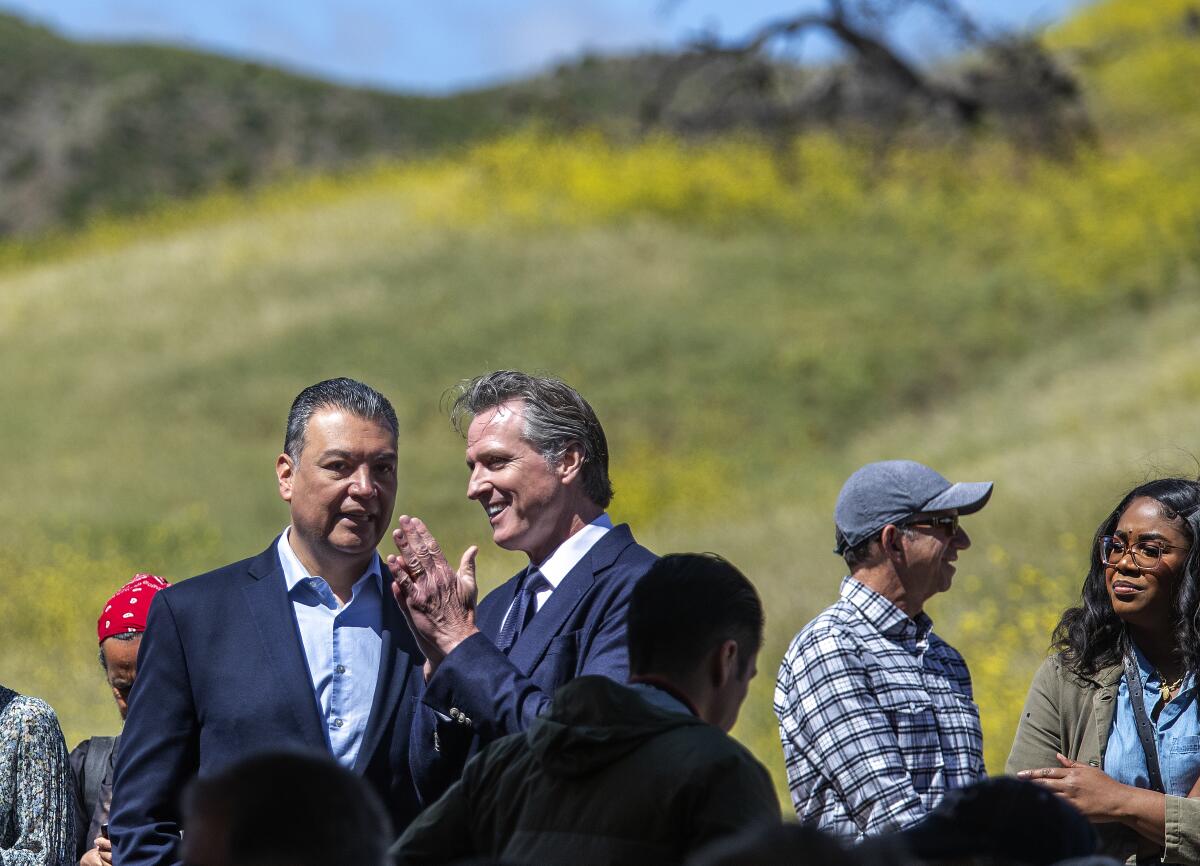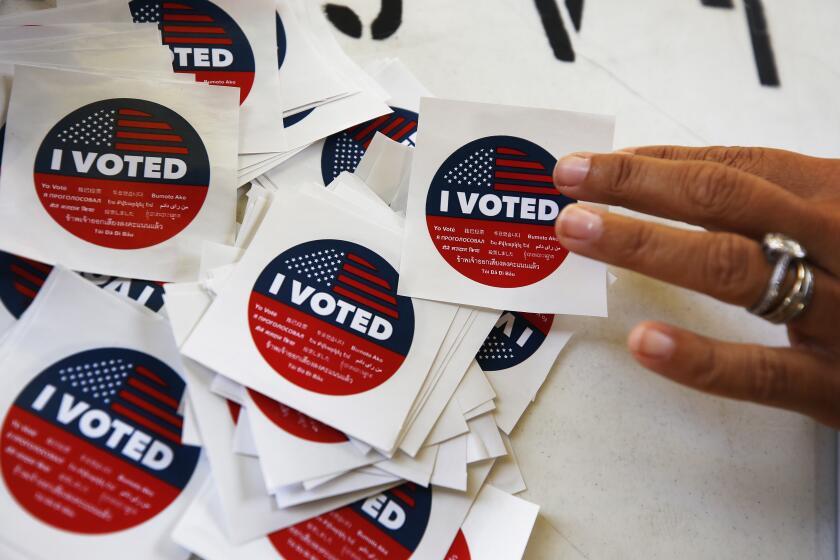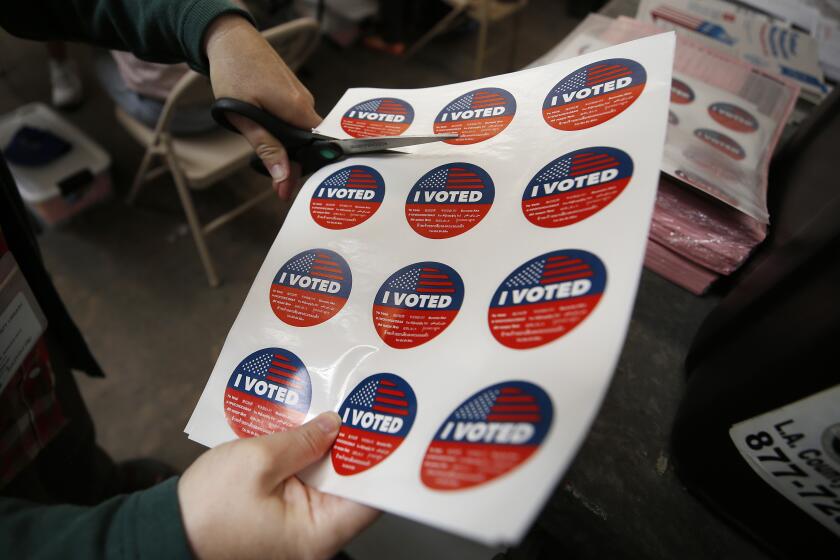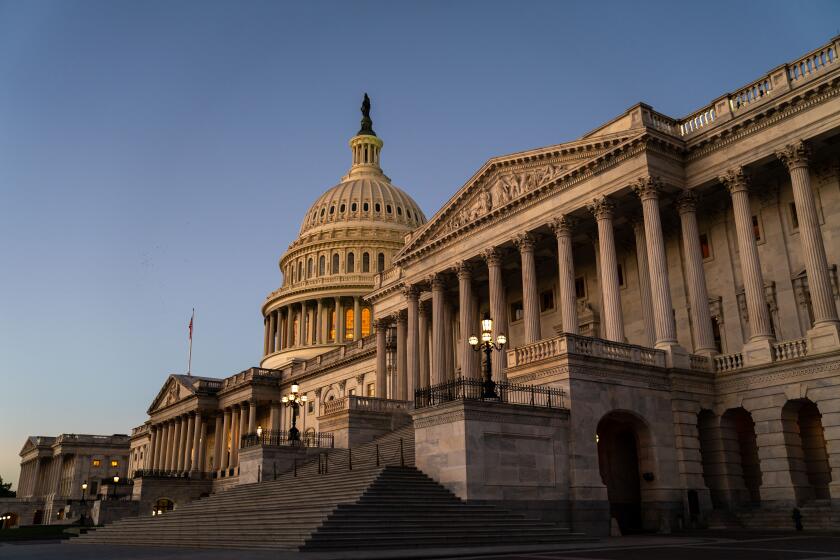The suspense in California’s June 7 primary election is in races far down the ballot

Gov. Gavin Newsom has barely bothered to campaign for reelection ahead of the June 7 primary. U.S. Sen. Alex Padilla, whom Newsom appointed less than two years ago, is expected to breeze through despite never being elected to his post.
With the lack of suspense in California’s marquee races, the greatest challenge facing voters may be rousing themselves enough to cast ballots to decide other contests that could sway the balance of power in Congress and the future of state criminal justice policies.
After Newsom beat back a recall, “the gubernatorial election seems like an afterthought,” said Republican political consultant Kevin Spillane.
“There are a couple very interesting down-ballot statewide races. But in general, from a statewide perspective, there is not a lot for voters to get excited about,” Spillane said before early in-person voting began Saturday in much of the state. “There are individual interesting races. They are probably most interesting to political insiders than the average voter.”
The low-intensity vibe threatens to suppress turnout and boil down the June electorate to habitual voters and hardcore partisans, a result traditionally favoring Republicans. That could be counterbalanced, however, by the contentious race for mayor of Los Angeles, a contest outshining everything else on the ballot. Los Angeles is home to 1 out of every 10 registered voters in the state, the overwhelming majority of whom are Democrats.
Low voter turnout would stand in stark contrast to California officials mailing a ballot to all 22 million voters with an active registration. Those ballots could largely remain unopened by voters who more often turn out to participate in presidential election cycles.
Among the more intriguing twists in statewide races is the emergence of candidates shunning affiliation with any political party, including a top candidate for California attorney general.
Sacramento Dist. Atty. Anne Marie Schubert, a career prosecutor who shed her GOP registration in 2018 and switched to “no party preference,” hopes to defy the long odds traditionally faced by independent candidates and finish in the top two in the primary. If successful, Schubert in November would face off against Atty. Gen. Rob Bonta, another Newsom appointee known for his liberal stance on criminal justice.
A nettlesome independent also has arisen among the collection of the 25, little-known challengers trying to unseat Newsom. Bay Area energy and homeless policy activist Michael Shellenberger blames Newsom and California’s Democratic power brokers for a litany of the state’s ills, including the homelessness crisis, rising violent crime and skyrocketing housing prices.
“If Anne Marie Schubert or Michael Shellenberger actually make it into the top two, then those races will be very exciting,” Spillane said. “You would see a lot of action.”
California’s 2022 primary election ballot includes races for governor, attorney general, the Legislature and Congress, as well as local contests.
All but one of the statewide contests have incumbent Democrats running for reelection, all of whom are expected to best their challengers in the primary and are favored to win reelection in November.
“The power of incumbency has never faded and, especially if it’s an election that people aren’t paying a lot of attention to, name recognition and experience on the job is always going to have a lot of sway,” said political scientist Kim Nalder at Sacramento State University. “ I think for the U.S. Senate race, that’s definitely going to be the case.”
FOR THE RECORD: An earlier version of this article quoted a former California GOP chairman saying the last time a statewide Democratic officeholder lost a reelection bid was in 1976. A Democratic lieutenant governor lost to a Republican in 1978.
Republicans have a shot at ending a losing streak — not winning an election for statewide office since 2006, the year Gov. Arnold Schwarzenegger won reelection and Steve Poizner became insurance commissioner. Republican Lanhee Chen, a public policy expert who teaches at Stanford University, is among the top contenders for state controller, a seat being vacated by Democrat Betty Yee, who is termed out.
If Chen survives the primary and advances to the November general election, it would be one of the few bright spots for those California Republicans wistfully watching their GOP brethren hold an upper hand in many of the nation’s most pivotal races, including those that could put Republicans in total control of Congress.
California’s 2022 primary election is Tuesday. Here’s how to cast a ballot.
In fact, Californians as a whole have been largely eclipsed from the political drama and spotlight of this year’s midterm elections.
Voters in states such as Georgia, Florida and Pennsylvania have faced a deluge of political ads — most of them negative — for Senate, governor and congressional races, yet nothing of the sort is happening in most of California. That’s in part because left-leaning California has been spared from the GOP’s intraparty warfare between candidates blessed by Donald Trump and Republicans distancing themselves from the falsehoods and bombast of the former president.
Still, California could have an influence, albeit a small one, on deciding which party controls the House, said Darry Sragow, a veteran Democratic strategist and publisher of the nonpartisan California Target Book.
“If things are close nationally, yes, California may turn out to be the decisive factor. But if it’s a wipeout for the Democrats ... the House will be in Republican hands, irrespective of what happens in California,” he said. “Under those circumstance, under the wiped-off-the-map scenario, then the question is how big is the Republican majority?”
With this being the first election since congressional district boundaries have been redrawn, which happens every 10 years after the census, the winners in quite a few of California’s 52 congressional races could surprise.
The top two vote getters — regardless of party — in the June primary will move on to the November election.
For some officeholders who were drawn into tighter districts — GOP Reps. Michelle Steel of Seal Beach and David Valadao of Hanford, and Democrat Rep. Katie Porter of Irvine — the top two vote-getters in the June 7 primary appear set. The real competitions, expected to draw national attention and millions of dollars in spending, will take place in the fall.
But in other contests, the primary will determine who incumbents face in November.
Democrats Christy Smith, a former assemblywoman, and John Quaye Quartey, a combat veteran, are fighting to take on Republican Rep. Mike Garcia in northern Los Angeles County. Garcia’s district is viewed nationally as one of the Democrats’ best pick-up opportunities — it now has a 12-percentage-point Democratic voter registration advantage.
Garcia has defeated Smith twice, most recently by 333 votes in 2020. Quartey has never held elected office but has raised about as much money as Smith.
In some of these races, politicians are trying to elevate the rival they perceive as the weakest.
Democratic Rep. Mike Levin of San Juan Capistrano — running for reelection in swaths of Orange and San Diego counties where the Democratic registration edge is 2 points — is sending Republican voters mailers that highlight Oceanside City Councilman Christopher Rodriguez’s opposition to abortion rights.
The fliers also question the antiabortion credentials of Brian Maryott, the former mayor of San Juan Capistrano who has partially self-funded his campaign and has been endorsed by the state GOP. No mention is made of another prominent Republican in the race, Orange County Supervisor Lisa Bartlett.
GOP Rep. Young Kim of La Habra is running in a new district that is more comfortably Republican than her current one. However, 4 of 5 voters in the district would be new constituents for her. She is aggressively advertising against Mission Viejo City Councilman Greg Raths — a fellow Republican who has a tiny fraction of her war chest. The move suggests Kim’s position is less secure than she might have anticipated.
GOP Rep. Young Kim is running in a new, more conservative Orange County district. Her sudden spending reflects new challenges posed by redistricting.
Paul Mitchell of Polling Data Inc., a for-profit research company that consults with Democratic campaigns and tracked the ballots cast in the recall, said that the percentage of eligible California voters registered to vote — 81.7% — is the highest the state has seen since the early 1900s, thanks in part to people being automatically signed up when they apply for a driver’s license.
Voters also have more ways to participate than in the last statewide election four years ago. Twenty-five of California’s 58 counties have adopted the state’s Voter’s Choice Act, an optional system that swaps out traditional neighborhood polling places for multi-purpose voting centers. The centers are open for 10 days before election day and allow late voter registration. With the list now including the state’s most populous regions, most Californians will have ample time to participate.
The lack of a premier contest at the top of the ballot, however, is expected to drive down voter turnout. Mitchell anticipates that only about 30% of registered voters will cast ballots — compared with 80% turnout in the November 2020 presidential election.
“The problem is the enthusiasm,” Mitchell said. “Do voters think that this election matters? Do they think that there’s actually a governor’s race? What percentage of the population can even name somebody running against Gavin Newsom? There is no real top of the ticket for Republicans.”
Times Sacramento bureau chief John Myers contributed to this report.
More to Read
Sign up for Essential California
The most important California stories and recommendations in your inbox every morning.
You may occasionally receive promotional content from the Los Angeles Times.
















